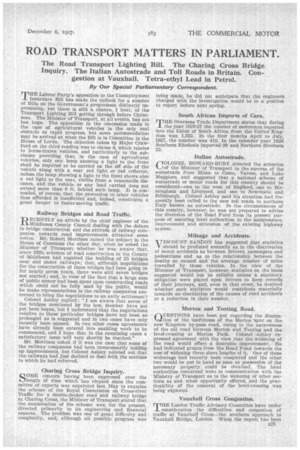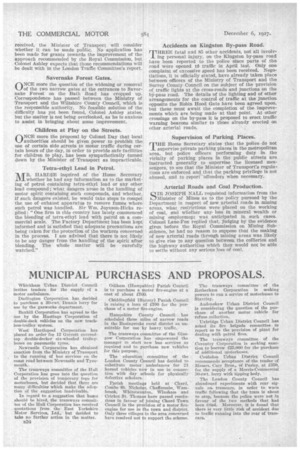ROAD TRANSPORT MATTERS IN PARLIAMENT.
Page 51

Page 52

If you've noticed an error in this article please click here to report it so we can fix it.
The Road Transport Lighting Bill. The Charing Cross Bridge Inquiry. The Italian Autostrade and Toll Roads in Britain. Congestion at Vauxhall. Tetra-ethyl Lead in Petrol.
By Our Special Parliamentary Correspondent.
THE Labour Party's opposition to the Unemployment Insurance Bill has made the outlook for a number of Bills on the Government's programme distinctly unpromising, but there is still a chance, I hear, of the Transport Lighting Bill getting through before Christmas. The Minister of Transport, at all events, has not lost hope. The opposition to the concession made in the case of agricultural vehicles is the only real obstacle to rapid progress, but some accommodation may be arrived at when the Bill is in Committee in the House of Lords. The objection taken by Major Crawfurd on the third reading was to clause 6, which relates to horse-drawn vehicles, and particularly to the subclause providing that, in the case of agricultural vehicles, only one lamp showing a light to the front shall be required to be carried on the off side of the vehicle along with a rear red light or red reflector, unless the lamp showing a light to the front shows also a red light to the rear, visible from a reasonable distance, and the vehicle or any load carried does not extend more than 6 ft. behind such lamp. It is contended, of course, that the protection to other vehicles thus afforded is insufficient and, indeed, constitutes a great danger to faster-moving traffic.
Railway Bridges and Road Traffic.
RECENTLY an article by the chief engineer of the • Middlesex County Council dealing with the delays in bridge construction and the attitude of railway companies towards road improvements attracted some notice. Mr. Robert Morrison raised the subject in the House of Commons the other day, when he asked the Minister of Transport whether he was aware that, since 1920, schemes of road construction in the County of Middlesex had required the building of 25 bridges over and under railways; that, although negotiations for the construction of these bridges had been going on for nearly seven years, there were still seven bridges not started ; and, in view of the fact that a large sum of public money had been spent upon constructing roads which could not be fully used by the public, would he make representations to the railway companies concerned to bring the negotiations to an early settlement? Colonel Ashley replied : "I am aware that seven of the bridges mentioned by the hon. member have not yet been begun, but I understand that the negotiations relative to these particular bridges have not been so prolonged as is suggested and in two cases have only recently been opened. In two other cases agreements have already been entered into enabling work to be commenced, and I hope that in the remaining cases a satisfactory issue will very shortly be reached."
Mr. Morrison asked if it was the ease that some of • the railway companies had been unnecessarily holding up improvements, but Colonel Ashley pointed out that • the railways had just decided to deal with the sections to which he had referred.
Charing Cross Bridge Inquiry. 00111E concern having been expressed over the }.../length of time which has elapsed since the committee of experts was appointed last May to examine the scheme of the Royal Commission on Cross-river Traffic far a double-decker road and railway bridge at Charing Cross, the Minister of Transport stated that the examination of the scheme was, for the present, directed primarily to its engineering and financial aspects. The problm was one of great difficulty and complexity, and, although all possible progress was
being made, he did not anticipate that the engineers charged with the investigation would be in a position to report before next spring.
South African Imports of Cars.
THE.Overseas Trade Department states that during the year 1926-27 the number of motorcars imported into the Union of South Africa from the United Kingdom was 1,532. In the four months April to July, 1927, the number was 410. In the calendar year 1926 Southern Rhodesia imported 98 and Northern Rhodesia 22.
Italian Autostrade.
C01.0.NEL HOWARD-BURY directed the attention of the Minister of Transport to the success of the
• autostrade from Milan to Como, Varese, and Lake. Maggiore, and suggested that a national scheme of autostrada or motor roads for this country should be considered—one to the west of England, one to Birmingham and Liverpool, and one to Newcastle and Edinburgh. Colonel Ashley said his attention had frequently been called to the new toll roads in northern Italy known as autostrade. In the circumstances of this country, however, he was not prepared to advise the diversion of the Road Fund from its present purpose of assisting local authorities in the maintenance, improvement and extension of the existing highway system.
Mileage and Accidents.
VISCOUNT SANDON has suggested that statistics V should be produced annually as to the distribution of motor accidents as between drivers, passengers and pedestrians and as to the relationship between the deaths so caused and the average number of miles travelled by those vehicles. In the view of the Minister of Transport, however, statistics on the basis suggested would not be reliable unless a statutory obligation were placed upon drivers to keep records of their journeys, and, even in that event, he doubted whether such statistics would contribute materially towards an elucidation of the causes of road accidents or a reduction in their number.
Merton and Tooting Road.
QUESTIONS have been put regarding the diminution of the usefulness of the Merton -spur on the new Kingston by-pass road, owing to the narrowness of the old road between Merton and Tooting and the level-crossing at Merton Park. Colonel Ashley expressed agreement with the view that the widening of the road would effect a desirable improvement. He had indicated grants from the Road Fund towards the cost of widening three short lengths of it. One of these 1,videnings had recently been completed and the other two would be put in hand so soon as possession of the necessary property could be obtained. The local authorities concerned were in communication with the Ministry of Transport as to the widening of other sections as and when opportunity offered, and the practicability of the removal • of the level-crossing was
being explored. .
Vauxhall Cross Congestion.
THE London Traffic Advisory Committee have under consideration the difficulties and congestion of traffic at Vauxhall Cross—the southern approach to Vauxhall Bridge, London. When the report has been
received, the Minister of Transport will consider whether it can be made public. No application has been made for grants towards the improvement of the approach recommended by the Royal Commission, but Colonel Ashley expects that those recommendations will be dealt with in the London Traffic Committee's report.
Savernake Forest Gates.
ONCE more the question of the widening or removal of the two narrow gates at the entrances to Savernake Forest on the Bath Road has cropped up. Correspondence has passed between the Ministry of Transport and the Wiltshire County Council, which is the responsible authority. No feasible solution of the difficulty has yet been found, Colonel Ashley states, but the matter is not being overlooked, as he Is anxious to assist in bringing about some improvement.
Children at Play on the Streets.
ONCE more the proposal by Colonel Day that local authorities should be given power to prohibit the use of certain side streets to motor traffic during certain hours of the day, in order to provide safe facilities for children to play, has been sympathetically turned down by the Minister of Transport as impracticable.
Tetra-ethyl Lead in Petrol.
AT R. HARDIE inquired of the Home Secretary lwhether he had any information as to the marketing of petrol containing tetra-ethyl lead or any other lead compound; what dangers arose in the handling of motor spirit containing such compounds, and whether, if such dangers existed, he would take steps to compel the use of exhaust apparatus to remove fumes where such petrol was handled. Sir WM. Joynson-Hicks rePlied "One firm in this country has lately commenced the blending of tetra-ethyl lead with petrol on a commercial scale. The Factory Department has been kept informed and is satisfied that adequate precautions are being taken for the protection of the workers concerned in the process. I am advised that there is not likely to be any danger from the handling of the spirit after blending. The whole matter will be carefully watched." Accidents on Kingston By-pass Road.
THREE fatal and 85 other accidents, not all involving personal injury, on the Kingston by-pass road have been reported to the police since parts of the road were opened td traffic in April last. Only one complaint of excessive speed has been received. Negotiations, it is officially stated, have already taken place between officers of the Ministry of Transport and the Surrey County Council on the subject of the provision of traffic lights at the cross-roads and junctions on the by-pass road. The details of the lighting and of other arrangements for the control of traffic at the junction opposite the Robin Hood Gate have been agreed upon, but these must await the completion of the improvements which are being made at that point. At other crossings on the by-pass it is proposed to erect traffic warning beacons similar to those already erected on other arterial roads.
Supervision of Parking Places.
THE Home Secretary states that the police do not supervise private parking places in the metropolitan area, but police officers performing duty in the vicinity of parking places in the public streets are instructed generally to supervise the licensed messengers, to see that the Minister of Transport's regulations are enforced and that the parking privilege is not abused, and to report offenders when necessary.
Arterial Roads and Coal Production.
SIR JOSEPH NALL requested information from the Minister of Mines as to the policy pursued by the Department in respect of new arterial roads in mining areas, what restrictions were placed on the working of coal, and whether anyloss in mineral wealth or mining employment was anticipated in such cases. Colonel Lane-Fox replied that, fudging by the evidence given before the Royal Commission on Mining Subsidence, he had no reason to suppose that the making of new arterial roads through mining areas was likely to give rise to any question between the collieries and the highway authorities which they would not be able to settle without any serious loss of coal.




















































































































